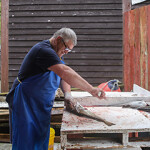Russia slowly unblocking Chilean salmon shipments

Russia’s veterinary service, Rosselkhoznadzor, has taken AquaChile's Cailin plant, located in southern Chile’s Quellón district, off its list of restricted plants which were blockaded earlier this year after Russian health authorities reportedly detected traces of crystal violet and antibiotics (oxytetracycline) in farmed salmon.
More plants are expected to be cleared by Rosselkoznadzor in the coming weeks, according to Alicia Gallardo, the national director of Chile’s national fisheries agency, Sernapesca.
"When I traveled to Russia a few months ago, I presented a dossier to the director of the Rosselkhoznadzor, Sergey Dankvert, for seven processing plants in Chile to be reviewed and unlocked,” she told local publication Salmonexpert. “They had processes unfavorable to their shipments to that market, and it is relevant to note now that the collaborative work has shown positive results.”
According to information published on Sernapesca’s website, a total of 19 establishments have been affected by the Russian’s actions: 17 plants and two cold storage warehouses.
"We have continued to work since February this year, where we increased the information exchange, holding a series of bilateral technical meetings in order to provide maximum guarantees regarding the strict safety controls that we carry out as a health authority in the field of aquaculture exports, so we hope to have a favorable response in the coming weeks," Gallardo said.
The Russian veterinary and phytosanitary supervision service “asked us for more information and one of the plants in the documents presented, that of AquaChile, was released as a result of the negotiations,” Gallardo said.
“Now we must insist with the other operations,” she said. “We will send a new dossier, with the guarantees required by the authority for unlocking, which they promised to do under those conditions.”
In March this year, the Russian health authority decided to lift the entry restrictions for Chilean salmonids from four Chilean processing plants, linked to companies Australis and Nova Austral. Salmones Austral had previously been taken off the list.
"I also offered to carry out this work with remote supervision, which will be evaluated by the Rosselkhoznadzor," Gallardo said.
In a move to calm Chinese unease over fears that imported salmon had served as a carrier of the coronavirus, Sernapesca in conjunction with Chinese officials recently carried out an unprecedented remote joint inspection of several Chilean salmon processing plants, reviewing safety and biosecurity control procedures implemented by the companies.
Russia has banned products from Australis, Salmones Aysén, and Yadran Quellón, while export restrictions were placed on some plants, including from Camanchaca, Acme Chile, Cermaq Chile, Inversiones Coihuin, and Nova Austral. Additionally, some operations for Multiexport and Cermaq were also identified as "enhanced laboratory monitoring" by Rosselkhoznadzor, meaning that exportation is possible, but each consignment of exported goods should be sampled for laboratory testing.
According to the figures from DataSalmon, as reported by Salmonexpert, 13,877 metric tons (MT) of salmon were exported to Russia from Chile between January and April this year, down 12.9 percent from the same period of 2019, bringing in USD 72.4 million (EUR 64.5 million) - a 20.1 percent drop.
AquaChile was reportedly the largest exporter to Russia, sending 6,020 MT and USD 28.9 million (EUR 25.8 million) in the period, followed by Salmones Camanchaca, with 3,562 MT and USD 20.5 million (EUR 18.3 million) in exports to Russia, and Australis Seafoods with 1,809 MT of Russian exports, valued at USD 6.9 million (EUR 6.1 million).
Photo courtesy of Sernapesca





Share